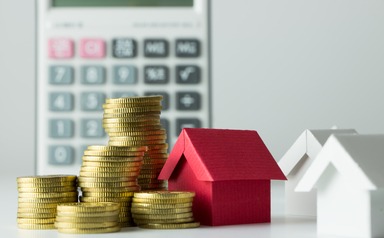If higher interest rates on credit cards, personal loans and other kinds of consumer debt over the last few years have put you in a bit of a financial bind, you may have a powerful asset to help you better manage your finances: The equity in your home. Strong increases in home values in recent years may give you the means to consolidate and pay off debts, escaping the "tender mercies" of MasterCard, VISA, AmEx and others.
Some financial writers paint a very rosy picture of credit card debt consolidation: lower interest rates, reduced payments -- what's not to like? Then there are the other articles such as Dave Ramsey's "The Truth About Debt Consolidation." He writes, "Debt consolidation is nothing more than a 'con' because you think you've done something about the debt problem. The debt is still there, as are the habits that caused it - you just moved it!"
The truth lies somewhere between those extremes. Debt consolidation done poorly has a very high failure rate -- about 80%, according to experts. Failed debt consolidation means that not only do you still have the debt monkey on your back, but you have drained the equity out of your property and may have increased your overall payments to boot. And there's more. Because you're using your home as collateral, debt consolidation through a home equity loan can increase your chances of losing your home.
Why Debt Consolidations Fail
Lenders offering home equity loans for debt consolidation don't usually mislead their customers. Monthly payments are, in fact, lower. Secured by real property, home equity loans generally do carry better interest rates than secured and unsecured consumer debt. And yet, debt consolidation may fail because of several misconceptions. Here are the truths:
1. Your debt does not go away. Your debt isn't really paid off with a debt consolidation second mortgage; you just exchange unsecured (e.g. credit card debt) and/or secured obligations (e.g. auto loans) for a secured loan (home equity loan). Even if monthly payments are more manageable, you still have the exact same amount of debt. It's amazing how many people forget this one simple fact: Even if more manageable, your debt doesn't go away until you pay it off. You've turned unsecured debt into secured debt. That change can have benefits, but many of them accrue to the lender, not you.
2. Your payment is lower because your formerly short-term debt may now have a longer repayment period. Auto and personal loans often have terms of 5-10 years, and consolidating these into a home equity loan can reset these repayment terms to a new 10 or even 20 years. Using HSH's mortgage calculator. compare the total interest you're slated to pay on these installment loans against the total interest you'll pay over the term of your potential home equity loan. You may see the required payment drop sharply, but the total costs over time may not.
As far as credit cards go, you can see right on your monthly statement how long it will take you to pay off the debt if you make only minimum payments -- and that's without ever using the card again! Given the way credit card interest and minimum payments are calculated, and comparing that to a finite 10 of 20-year repayment period for a home equity loan at a lower interest rate, you'll likely save a bundle of interest cost over time -- but the monthly payment reduction might not be much as you think. A credit card balance of $12,000 with a 2% monthly repayment ($240 per month) converted to a 10-year home equity loan at 10% sees the required payment fall, but only by about $82 per month.
3. Debt consolidation does not resolve your over-spending issues. If you got into trouble because you couldn't control your spending, moving other loan balances into a new loan won't teach you spending restraint. It's not uncommon to hear of borrowers who have done a debt consolidation run up new balances on formerly-cleared credit card accounts. Debt consolidation coupled with budgeting advice and credit counseling may be the only way to get financially healthy for good. If not done properly, "Debt consolidation can be a shiny brand-new new shovel to dig yourself deeper into debt," said HSH VP Keith Gumbinger.
Debt Consolidation the Right Way
Debt consolidation can in fact lower your payments and save you a great deal of money. Home equity loan rates are currently between 8% and 10% for borrowers with good credit and solid equity stakes. This is a fraction of the interest rate many credit card holders are paying.
It used to be that consolidating your debts using the equity in your home also provided the chance for some tax benefits, too. However, since the 2017 Tax Cuts and Jobs Act, interest on any home-secured debt can only be deducted if it is used to "buy, build or substantially improve" a qualified residence, taking a bit of the shine off of using home equity for other purposes such as debt consolidation.
To successfully consolidate your debt with a home equity loan, do these three things:
1. See a credit counselor. Find a reputable credit counselor, one who charges reasonable fees and doesn't try to sell you a product or a plan. Your sessions should focus on learning to budget, paying bills on time and saying "no" when you can't afford something you want. You can look up local outfits or start with a national one like the National Foundation for Credit Counseling (nfcc.org), which was established in 1951. Housing and Urban Development (HUD) has a lookup for home-debt related counselors (https://entp.hud.gov/idapp/html/hecm_agency_look.cfm; change the type of counselor you are seeking to "Certified" rather than "HECM") to find counselors in your area.
2. Get rid of the problem. Close out your credit card accounts. Be sure to call the card companies and have them report the accounts as "closed by cardholder" to the credit bureaus (or you can send a credit card cancellation letter). When they send you new cards (and they almost always try this), shred them and call to confirm that your account remains closed. Switch to a debit card so you can better control your spending. Yes, closing accounts can have an effect on your credit score, but so can not being able to make payments on time or at all.
3. Accelerate your payoff. Your debt consolidation loan payment will be lower than the total of all your credit card payments (or you wouldn't have taken the loan, right?). But you're not done. Decide, with the help of your credit counselor if necessary, how much extra you can afford to pay toward retiring that balance. Input that as an extra principal payment in the mortgage amortization calculator, and it should tell you how long it will take to pay off the debt completely and how much interest you will pay over the life of the loan.
This helps you plan for financial health. Once you have eliminated your consumer debt, take what you are no longer paying each month and put it into your savings account. Getting out of debt and on the path for a healthy financial future won't be simple or easy; it will take both time and discipline to get there, and while your home equity can help, there are no quick fixes along the way.
Before you use the equity in your home for anything, you should read HSH's Guide to Home Equity Loans and Lines of Credit. However, if you're ready to take the plunge and consolidate your debt using your home equity, you'll want to shop home equity lenders, rates and offers to see if what's available in the market will work for you.
This article was revised by Keith Gumbinger.



